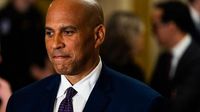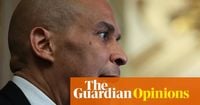US Democratic Senator Cory Booker has come under fire for neglecting to mention the ongoing humanitarian crisis in Gaza during a marathon 25-hour speech in the Senate, which was primarily aimed at protesting President Donald Trump's perceived attacks on democracy. Despite the length of his address, critics noted that Booker failed to mention Israel's military actions in Gaza or the implications of Trump's policies on pro-Palestinian protesters, raising questions about his commitment to human rights.
Booker's speech, delivered over the course of a single session, was inspired by constituents who reached out to express their fears and frustrations regarding Trump's administration. Yet, as social media users pointed out, not once did Booker reference the plight of Palestinian Americans, who are directly affected by the ongoing violence in Gaza, which many have characterized as genocide.
"He spoke for 25 hours and never mentioned Palestine once," remarked a user on social media platform X, highlighting a significant gap in Booker's discourse. Human rights attorney Craig Mokhiber criticized Booker for what he termed hypocrisy, stating, "In 25 hours of performative nonsense, lobby-paid shill of the Israeli regime Senator Cory Booker did not have a single word to say about the genocide in Palestine, one funded and defended by the very body he was addressing." Mokhiber's comments reflect a growing frustration among activists who feel that the U.S. political establishment is ignoring the humanitarian crisis in Gaza.
During his speech, Booker wore an Israeli hostage solidarity pin and praised the Abraham Accords, agreements aimed at normalizing relations between Israel and several Arab nations. However, critics noted that he did not address the civil rights violations occurring under Trump's administration, particularly the crackdown on pro-Palestinian demonstrators and scholars. Since Trump took office, there have been reports of increased scrutiny and deportations of international students who participated in pro-Palestinian protests.
One notable incident occurred last month when Trump ordered federal immigration forces to detain Mahmoud Khalil, a Palestinian green card holder, from his home in New York due to his involvement in peaceful demonstrations at Columbia University. This action has since led to the detention and deportation of dozens of others who have expressed pro-Palestinian views. Critics pointed out that while Booker condemned antisemitism and spoke against civil rights abuses, he failed to mention Khalil or the hundreds of students affected by these policies.
"Alas, Cory Booker spoke for 25 hours but couldn't find time to mention Mahmoud Khalil or any of the other 300+ college students being deported by Trump for pure political speech," one user on X lamented. This sentiment resonates with activists who argue that Booker's long speech was more about political theater than addressing pressing issues affecting marginalized communities.
Booker's history of support for Israel further complicates his position. In December 2024, he faced backlash for being photographed with Yoav Gallant, the former Israeli defense minister, who has been charged by the International Criminal Court (ICC) with potential war crimes. This association has led some to question Booker's credibility as a champion of human rights, particularly in relation to the Palestinian cause.
In his lengthy address, Booker emphasized a national crisis, stating, "These are not normal times in America, and they should not be treated as such." He spoke passionately about the need for Americans to stand up and speak out against injustices, referencing the struggles of various groups and the detrimental effects of Trump's policies. He highlighted the impact on seniors reliant on Social Security, the economic turmoil affecting everyday Americans, and the dismantling of consumer protections.
Booker criticized the president for initiating trade wars, firing regulators, and undermining agencies designed to protect consumers. He painted a grim picture of the current state of the nation, stating, "In just 71 days, the president of the United States has inflicted so much harm on Americans’ safety, financial stability, the core foundations of our democracy, and even our aspirations as a people." His remarks reflect a broader concern about the erosion of democratic norms and the rise of authoritarianism under Trump's leadership.
Furthermore, Booker lamented the abandonment of international commitments and the lack of action in response to climate disasters that have been devastating communities across the country. He remarked on the censorship of the American press and the intimidation faced by universities and their students, particularly those who engage in political discourse surrounding Palestine.
Despite his powerful rhetoric, many remain unconvinced of Booker's sincerity, especially given his track record of supporting pro-Israel policies. Scholars and activists have voiced their discontent, arguing that true leadership requires addressing the complexities of international human rights issues, including the situation in Gaza.
As the debate continues, it remains to be seen how Booker will navigate the criticisms and whether he will take a more proactive stance on issues affecting Palestinian Americans and the broader humanitarian crisis in Gaza. The calls for accountability and genuine advocacy for human rights are louder than ever, and many are watching closely to see if Booker will respond to these demands.
In the end, the disconnect between Booker's lengthy speech and the pressing realities faced by many Americans, particularly those affected by the crisis in Gaza, raises important questions about accountability and representation in U.S. politics. As constituents demand more from their elected officials, the pressure for meaningful dialogue and action on these critical issues will only intensify.


